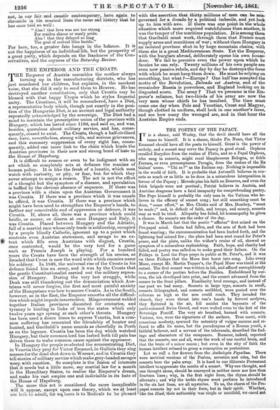THE EMPEROR AND THE CROATS.
THE Emperor of Austria resembles the mother always turning up in the manufacturing districts, who has just murdered her children, but explains, in the meekest voice, that she did it only to send them to Heaven. He has destroyed another constitution, only that Croatia may be blessed with that happy Utopia which he styles Imperial unity. The Croatians, it will be remembered, have a Diet, a representative body which, though not exactly in the posi- tion of the Hungarian Diet, is an ancient and legal authority repeatedly acknowledged by the sovereign. The Diet had a mind to maintain the prescriptive union of the province with Hungary, which has lasted since 1180, and said so, and was, besides, querulous about military service, and has, conse- quently, ceased to exist. The Croats, though a half-civilized race, have, nevertheless, strong wills, and serious grievances, and this summary suppression of every right has, conse- quently, added one more link to the chain which binds the Austrian provinces in their new and strong bond of hate to the House of Hapsburg. It is difficult to reason or even to be indignant with an act which so completely sets at defiance the maxims of human policy. It is like the freak of a lunatic, which men watch with curiosity, or pity, or fear, but for which they never attempt to assign a reason. The act is not the effect of a thought but the symptom of a disease, and speculation is baffled by the obvious absence of sequence. If there was a province with a claim upon the Austrian Government it was Croatia. If there was a province which it was unsafe to offend, it was Croatia. If there was a province which might have been used to strengthen the Emperor's hands, to further any conceivable end of oppression or defence, it was Croatia. If, above all, there was a province which could bridle, or annoy, or disarm at once Hungary and Italy, it was Croatia. Placed between Hungary and the Adriatic, full of a martial race whose only trade is soldiership, occupied by a people blindly Catholic, ignorant up to a point which contents even Austrian statesmen, and savage to an ex- it, tent which fills even Austrians with disgust, Croatia, once contented, would be the very tool for a game such as Francis Joseph is playing. For a hundred years the Croats have been the strength of his armies, so dreaded that Croat is now the word with which enemies name his soldiery. In 1848, the universal rise of the Croats in his defence found him an . army, and it was by the Croats that the gentle Constitutionalist carried out the military repres- sion of Hungary. During the very last struggle, while Deak was still thundering out the denunciation which Aus- trians will never forgive, the first and most painful anxiety of the Hungarians was how to secure Croatia. As in the South, however, so in the East, the Emperor smooths all the difficul- ties which might impede insurrection. Misgovernment welded together Italian provinces disunited for centuries, and tyranny is binding in links of iron the states which only twelve years ago sprang at each other's throats. Hungary has been used a dozen times to repress Venetia, but a com- mon suffering has cemented the friendship of hunter and hunted, and Garibaldi's name sounds as cheerfully in Pesth as on the lagunes. Croatia has been the dog which watched Hungary, but their common lord has lashed both till pain has driven them to make common cause against the oppressor. In Hungary the people re-elected the remonstrating Diet, in Venetia they pray for Victor Emanuel, in Gallicia they sing masses for the dead shot down in Warsaw, and in Croatia they tell stories of military service which make grey-headed savages weep with emotion. So complete is the fusion of interests that it needs but a little more, say martial law for a month in the Hereditary States, to realize the Emperor's dream, and make his vast empire one and indivisible in its hate of the House of Hapsburg. The more this act is considered the more inexplicable will it appear, except upon one theory, which we at least are loth to admit, for wq leave it to Radicals to bo pleased with the assertion that thirty millions of men can be Baia- governed for a decade by a political imbecile, and yet look up to him with awe. If there was one point in the whole situation which more required watchfulness than another, it was the temper of the maritime population. It is among them that Garibaldi must work, through them that France must supply arms and munitions of war; without them Hungary is an isolated province shut in by huge mountain chains, with them she is a great Mediterranean State. Yet the Emperor, with the burglars abroad, deliberately opens his own house- door. We fail to perceive even the power upon which be fancies he can rely. Twenty millions of his own people are even now passive rebels, and day by day he destroys the force with which he must keep them down. He must be relying on something, but what ?—Europe ? One half has accepted the motto of the Revolution, Delenda est Austria, and of the remainder Russia is powerless, and England looking on in disgusted scorn. The army ? That we presume is the Em- peror's reliance, but two-thirds of his army are now the very men Whose chiefs he has insulted. The time must come one day when Pole and Venetian, Croat and Magyar, though clothed in uniform, shall look in one another's faces, and see how many the wronged are, and in that hour the Austrian Empire ends.






























 Previous page
Previous page